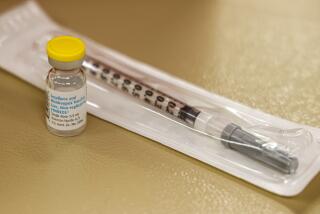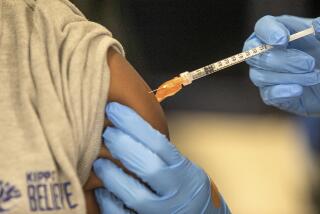Low reaction rate in Gardasil study
A large study of girls and young women who received the cervical cancer vaccine Gardasil has found only three confirmed cases of allergic reaction out of 380,000 shots.
The study, published today in the British Medical Journal, was based on vaccination data from Australia, which has had a nationwide program to vaccinate females ages 12 to 26 in schools since April 2007.
The study bolstered the case that the vaccine is relatively safe despite lingering concerns from some doctors and parents over its efficacy and safety.
The study, led by researchers at the Royal Children’s Hospital in the state of Victoria, was prompted by media and medical reports of girls suffering allergic reactions after receiving a shot. Some patients reported dizzy spells, fainting or even temporary paralysis.
Similar concerns over Gardasil’s safety have been raised in the U.S. even after the Food and Drug Administration in June 2006 approved the vaccine to protect against four strains of human papillomavirus that cause most cervical cancers and genital warts.
Some people do suffer serious reactions to vaccines, said Dr. Nicola P. Klein, co-director of Kaiser Permanente Vaccine Study Center in Oakland, who was not associated with the study. But it’s not always easy to determine whether a reaction that occurred after someone is vaccinated was actually caused by the vaccine.
“If someone gets an injection and a few hours later there’s some redness and pain at the injection, then that’s pretty clear that it’s from the injection,” Klein said. But “many other things happen by chance alone, and [the person] just happened to get vaccinated beforehand.”
Klein added that researchers have begun to look into whether teenagers might be more at risk of fainting after vaccination. Immunizations, a routine of early childhood, are relatively new for adolescents with the advent of a meningitis vaccine; a booster for tetanus, diphtheria and whooping cough; and now the HPV vaccine.
To confirm the possible allergic reactions to Gardasil, the Australian researchers collected vaccination data from the states of Victoria and South Australia.
Out of the 380,000 Gardasil doses administered, researchers found 35 reports of allergic reactions including hives, rashes and, in two cases, anaphylactic shock -- a sudden, severe reaction that can cause airways to tighten, among other symptoms.
Of the 35 patients, 25 agreed to skin-prick and injection testing to confirm their reactions. Just three of the 25 were found to have a “probable hypersensitivity” to the vaccine, including the two with anaphylaxis, the study found.
In the U.S., the Centers for Disease Control and Prevention recommends Gardasil be part of routine vaccinations for girls ages 11 and 12. The vaccine is most effective if given before young women become sexually active and possibly exposed to the virus.
About a quarter of U.S. teen girls -- roughly 2.5 million -- received at least one of the three-shot series in the vaccine’s first full year of distribution, according to the CDC. The goal is 90%. Only Virginia has made Gardasil mandatory.
The FDA has received more than 10,000 “adverse events” reports from physicians and patients after Gardasil injections.
Most involved pain at the injection site, headaches, nausea, fainting or fever. The 6% of incidents that were deemed serious included almost 30 deaths as well blood clots and several cases of Guillain-Barre syndrome, an autoimmune disease that can lead to paralysis. The FDA says there is no evidence that Gardasil caused the deaths or led to Guillain-Barre.
--






